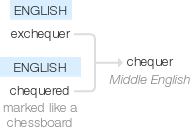Checker
Middle English: from exchequer. The original sense ‘chessboard’ gave rise to chequered meaning ‘marked like a chessboard’; hence the sense ‘pattern of squares’ (early 16th century).
wiktionary
check + -er
From Middle English cheker, aphetic from Anglo-Norman escheker(“chessboard”), from Latin scaccarium, thus ultimately morpheme-for-morpheme cognate to etymology 1.
Alteration of chequer.
etymonline
checker (n.1)
mid-13c., "game of chess (or checkers);" c. 1300, "a chessboard, board with 64 squares for playing chess or similar games; a set of chessmen" (all now obsolete), a shortening of Old French eschequier "chessboard; a game of chess" (Modern French échiquier), from Medieval Latin scaccarium "chess-board" (see check (n.1)).
Meaning "pattern of squares" is late 14c. Meaning "a man or piece in the game of checkers" is from 1864. British prefers chequer. From late 14c. as "a checked design." The word had earlier senses of "table covered with checked cloth for counting" (late 12c. in Anglo-Latin), a sense also in Old French (see checker (n.2)).
checker (v.)
"to ornament with a checked or checkered design, decorate with squares of alternate color," late 14c. (implied in checkered), from Old French eschequeré and from checker (n.1). Related: Checkering.
checker (n.2)
"table covered with a checked cloth," specialized sense of checker (n.1), late 14c. (in Anglo-Latin from c. 1300); especially a table for counting money or keeping accounts (revenue reckoned with counters); later extended to "the fiscal department of the English Crown; the Exchequer (mid-14c.; in Anglo-Latin from late 12c.).
checker (n.3)
"one who checks or controls," especially "one who collects money for others," 1867, agent noun from check (v.2).
